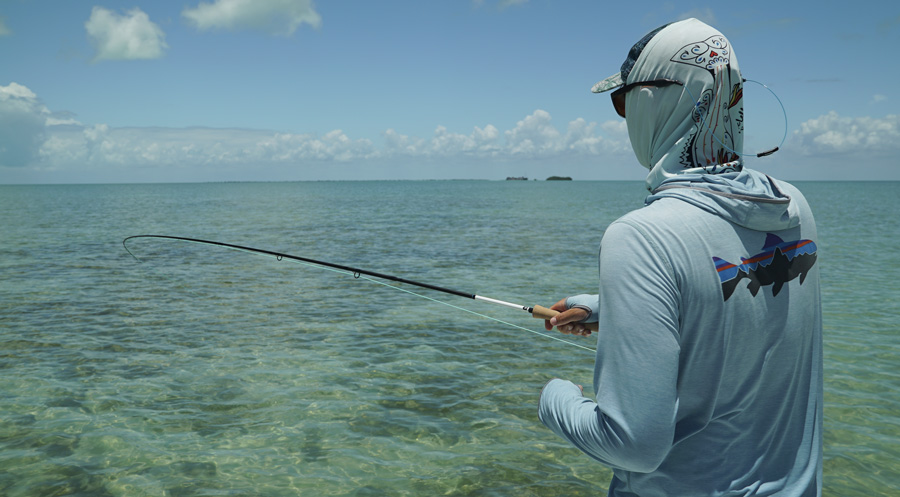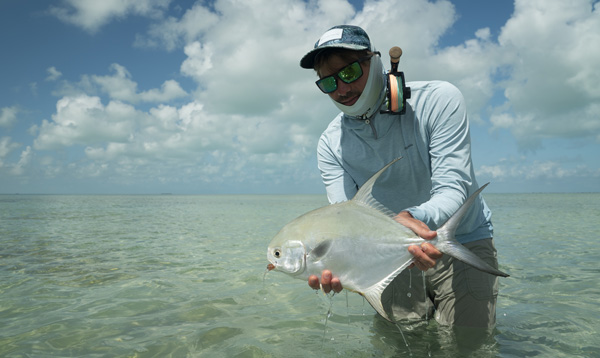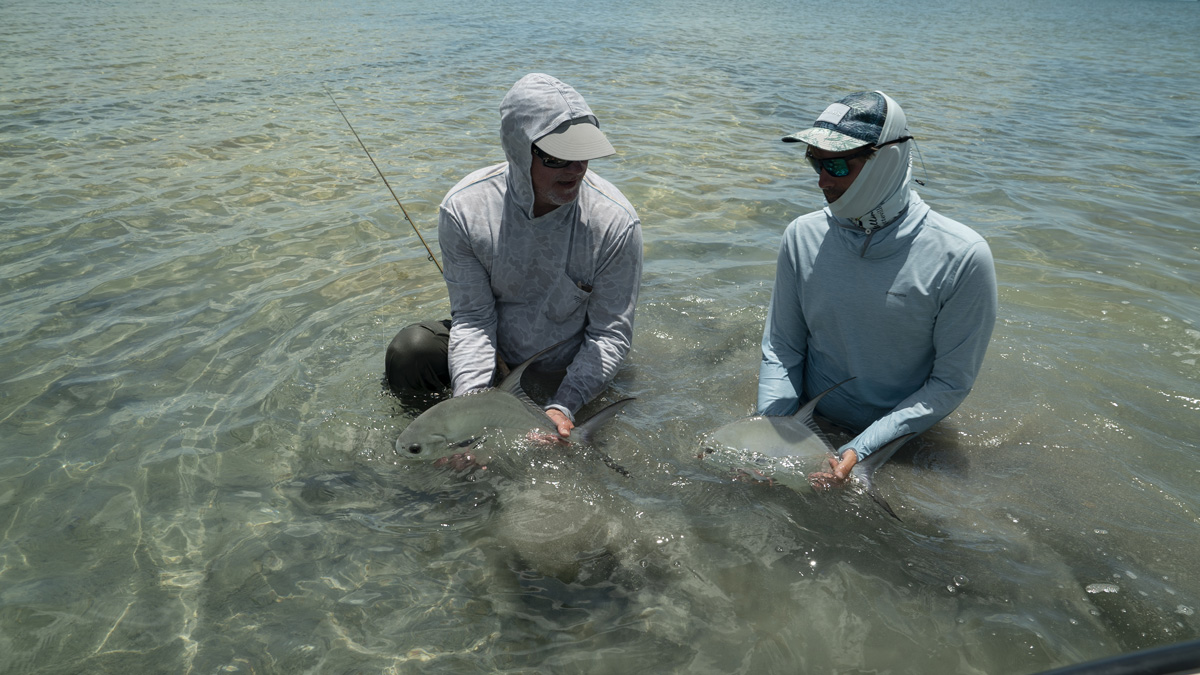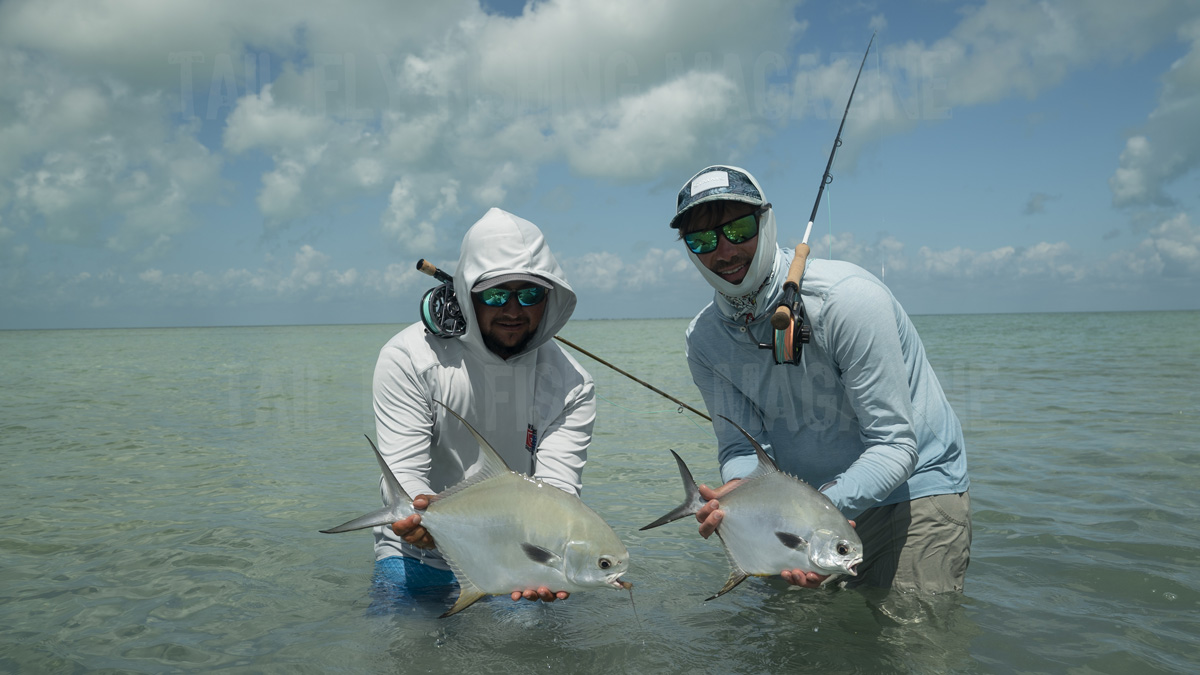Deep Gravy: Permit guilt, creeping conflict, and fly fishing ecstasy in Belize
by Trey Reid
We left the dock at 6:30 a.m., a relatively late departure by the standard we had set over the previous four days of fishing around Ambergris Cay, Belize. By any definition, the trip was already an unqualified success—so productive that it’s awkward even now to recount it. I had landed four permit and recorded two Grand Slams—the most productive saltwater fly fishing trip of my life—and my friend John Bracey, with whom I fished most of the week, had caught his first two permit, the first coming on the same day as his first tarpon and closing out a Grand Slam. Over a breakfast of San Pedro Jacks and fresh mango, we agreed that we couldn’t complain if we didn’t catch a single fish on the last day, a sentiment we shared with our guide as we idled away from the dock.
“Everything today is gravy,” said Captain Gordy Marin, who had guided us all week and who was now steering his boat, Silver Ghost, beneath the Boca del Rio Bridge in San Pedro.
We idled out of the river channel into the lagoon on the west side of town, rounding the southern point of Turtle Island before heading north on the bay side of Ambergris. Ever vigilant, Marin scanned the turquoise waters as we glided across the surface. We slowed to an idle upon reaching an area where we’d found permit the previous afternoon. But the fish weren’t there, so we continued northward to another flat next to a small island. Marin pointed out a school before the boat came off plane.
Nervous water sold out the school, which materialized fully in copious dark shapes and random silver flashes. Tips of dorsal fins and tails punctured the gently rippled surface less than a hundred yards from the boat. Bracey scrambled over the panga’s starboard side as the anchor found purchase on brilliant white sand. Marin eased into the water behind him, and they made a quick but cautious approach to get ahead of the blithely feeding school.
 Bracey had several good shots about 75 yards from the boat before the school made a hard right turn toward the rising sun—well above the horizon now but still low in the eastern sky. Their course was bringing them straight toward me and the anchored panga. I pulled my 9-weight from the rod holder and stripped line off the reel as I climbed out of the boat and scurried into casting position.
Bracey had several good shots about 75 yards from the boat before the school made a hard right turn toward the rising sun—well above the horizon now but still low in the eastern sky. Their course was bringing them straight toward me and the anchored panga. I pulled my 9-weight from the rod holder and stripped line off the reel as I climbed out of the boat and scurried into casting position.
The school was moving right to left about 50 feet in front of me, and it was massive. I laid a Raghead Crab in front of the lead fish and slowly stripped it. Nothing. I sent another cast into the front-left portion of the school and made long, slow strips. They were on it, turning hard to track the fly straight toward me. My heart rate accelerated with every inch of the gap they closed: 30 feet … 25 feet … keep stripping, man … 20 feet … eat it, you bastards!
I imagined a watery demise, being overrun by a school of a hundred feeding permit, flogged to death by black tails, puffy lips sucking on the remnants of my floating corpse on a Belizean flat—poetic retribution, perhaps, for the zeal with which I’ve pursued their kin. But with just a few feet of fly line outside the rod tip, the school slowly peeled to its right and reversed direction.
“Let’s go find another school,” Marin said.
We barely had time to plane out the panga before another big school appeared a few hundred yards north of where we had just been refused.
Ignominy and Incredulity
I’m not sure it’s possible to feel guilty about catching fish, but I came close last April in Belize. I still struggle to describe the sensation; a lingering fear of misunderstanding and wrong assumptions about my motivations makes me hesitant even now to mine the experience too deeply.
Like most permit anglers, I’m familiar with failure. I live in landlocked flyover country, more than 1,000 miles from the nearest permit water. As my evolution as a saltwater fly angler has progressed, I’ve spent a considerable amount of money and time with modest returns in the way of permit. But that changed drastically—and dramatically—during five days in northern Belize.
I landed a permit within the first hour of fishing on the first day of the trip, and I was truthfully content not to catch another fish all week. But the fishing only got better. Two days later I watched Bracey catch his first tarpon, a hefty resident fish in the 50-pound range, and then I subdued a similar fish an hour and a half later. A few hours after that, I climbed atop Marin’s poling platform to behold him and Bracey wading toward a school of permit under a leaden sky. Minutes later, my friend was admiring his first permit, which was also the final element of his first Grand Slam. Certain that I’d have to experience that rare thrill as a vicarious witness, I was surprised when Marin told me to grab my fly rod and get my ass in gear to intercept the school again. After two missed eats in quick succession, I was hooked up to my second permit in three days. Thirty minutes later, I was overjoyed to catch a scrawny bonefish that gave me my first Grand Slam.
 We were breathing rarefied air, but I wasn’t reticent about sharing tales of our good fortune with friends back at El Pescador Lodge. I had never tasted this kind of angling success, and I was inebriated by the mysterious elixir. So this is what success feels like?
We were breathing rarefied air, but I wasn’t reticent about sharing tales of our good fortune with friends back at El Pescador Lodge. I had never tasted this kind of angling success, and I was inebriated by the mysterious elixir. So this is what success feels like?
The next day, elation almost imperceptibly gave way to ignominy and incredulity. We started early again, and I was treading water to take a picture with another solid tarpon before the San Pedro waterfront was fully awake. Bracey and I both landed bonefish before lunchtime as we awaited our turn to board the permit carousel on the flat where we’d both caught them the previous day. The word was out among Ambergris guides, and the school was getting pounded, with guides lining up their boats to have their anglers take turns wading onto the flat.
Marin had seen enough, so we left to look for less-pressured fish, finding them a few miles away. Bracey hooked up on his first cast to a school of big permit, but the fish slipped the hook 30 seconds into the fight. Marin spotted another school a few minutes later, and we waded toward them under the bright midday sun. They ignored the first presentation, but after my second cast and a few long, slow strips, the line came tight. It was my third permit of the week, a bruiser leaning toward 25 pounds, and it capped a second Grand Slam. Bracey caught the day’s second permit just a few minutes later, and I added my second of the day and fourth of the trip before we headed back to the lodge.
I was ecstatic, but conflicted thoughts crept into my head. This isn’t supposed to be happening. Is this what impostor syndrome feels like?
Bracey, who’s unflappably modest, must’ve felt something, too. “You know, maybe it’s getting to the point that we shouldn’t say anything about this when we get back,” he said. “I mean, if somebody asks for details about our day, I’m not gonna lie about it. But maybe we shouldn’t volunteer anything.”
Moonwalking up the dock was out of the question. Until it wasn’t. But we were the first boat back to the lodge, and only our wives and Marin witnessed my shameless spectacle. Just getting it out of my system, you know. And we still had one more day of fishing.
So much gravy
It was the last of five days on the water, the last Friday of the month, the day before a new moon. Permit were everywhere, but we hadn’t yet fed one despite several good early shots. That was about to change.
Marin got the boat well ahead of another big school. More than a hundred strong, it was pushing northward parallel to an uninhabited cay. We dropped anchor in knee-deep water and all three bailed out of the boat to ease into position. Bracey hooked up quickly, line peeling off his reel as the rest of the fish stayed tightly together and slowly reversed course via a wide arcing turn in slightly deeper water. Marin and I took off to intercept the school, and there was no easing into position this time. We rushed southward, sporadically sinking into loose silty pockets in the sand. I covered the hundred yards through thigh-deep water and sucking mud in a time best measured by a sundial, my heart pounding from a combination of exertion and excitement, but we were in position.
I cast in front of the school at a perpendicular angle. It wasn’t my best presentation, and Marin made sure I knew that. The captain and I had reached a shaky détente by the last day of the trip. He had revealed himself as a demanding young guide on the first day, brash almost to the point of insolence at times. But he had put us on the fish, and we were improving as a result of his prodding and pressure. He wanted perfection and expected at least something approaching excellence; mediocrity was intolerable. “I’m not gonna lie to you,” he said. “That cast wasn’t good.”
I reminded him that I was literally twice his age, and that I didn’t usually run the 100-meter dash in water and mud before casting to a school of a hundred permit.
“It’s not easy to catch permit, man,” he said. “You got to work for it sometimes.”
Fair enough. We quickly went back to work, getting into another school, or maybe the same school, a few minutes later. Marin got in on the action and doubled with Bracey, and I brought the morning’s fourth permit to hand 15 minutes later. My second fish of the morning gave us five before 9 a.m. And it was all gravy.
“Yeah, man,” Marin said. “But we got so much gravy, it’s gonna get so deep it’s gonna cover up the turkey.”
Our metaphorical gravy, a fly fishing dream made of glimmering slabs with forked black tails, indeed grew deeper. We spent the next four hours chasing two big schools of permit that roamed back and forth along the cay, wading into the water for stealth when we could and casting from the bow of Marin’s panga when there wasn’t time to scramble over the side. Together, we hooked six more permit, bringing five to hand. The sixth should’ve been landed, but it was part of a triple hook-up that Marin lost in his zeal to make it a quadruple.
 I hooked up with a dinner-plate permit from the front of the panga during the day’s last frenzy, jumping over the port side to fight it while Bracey crawled over the starboard gunwale to chase a portion of the school that veered right when it split in two. Marin also waded into the fray, grabbing one of my rods and sending a cast toward the part of the school that lingered with my fish. He stripped and set the hook on Silver Ghost’s tenth permit of the day. Meanwhile, Bracey covered about 150 circuitous yards through soupy sand, still in the game, advancing and retreating, drifting and dancing in all directions as the permit dictated. He had numerous good shots that didn’t yield eats. “Run, John,” Marin coached and cheered. “More right, man. More right. Go, John! You can do it, man! I trust you, John. Run, John!” I couldn’t hold back laughter. Or my opinion, yelling, “Don’t die, John!”
I hooked up with a dinner-plate permit from the front of the panga during the day’s last frenzy, jumping over the port side to fight it while Bracey crawled over the starboard gunwale to chase a portion of the school that veered right when it split in two. Marin also waded into the fray, grabbing one of my rods and sending a cast toward the part of the school that lingered with my fish. He stripped and set the hook on Silver Ghost’s tenth permit of the day. Meanwhile, Bracey covered about 150 circuitous yards through soupy sand, still in the game, advancing and retreating, drifting and dancing in all directions as the permit dictated. He had numerous good shots that didn’t yield eats. “Run, John,” Marin coached and cheered. “More right, man. More right. Go, John! You can do it, man! I trust you, John. Run, John!” I couldn’t hold back laughter. Or my opinion, yelling, “Don’t die, John!”
Now a dozen yards left of the boat, I kept the smallish permit tight but wasn’t rushing anything—if I’m being honest, to prolong the chance of a triple hook-up. Bracey’s effort was rewarded, and line surged off of his reel as the day’s 11th permit bowed the rod. I gulped from the cup of permit glory, taking in the spectacular sight of three fly fishers with bent rods, pulling against fastidious fish and long odds. I was still incredulous, but no longer sheepish. I reckoned that I had paid my dues in money, sweat, time, and disappointment. It’s supposed to be fun, and right then, I couldn’t imagine it ever being better.
Marin broke my reverie when he shuffled back to the panga, still fighting his permit, and grabbed another fly rod out of the rod holder. “What the hell are you doing?” I asked. “I can’t help it, man,” he said. “I’m greedy.”
Our cocky young guide tucked the fly rod with the fish tethered to it between his thighs and laid out a long cast with the second spare rod. It was too much gravy. The quadriceps method of fighting permit caused tension on the line, and Marin’s fish broke off. Bracey and I landed our fish, kneeling down in the water to release the fish together as Marin snapped a photograph.
I might never pass this way again. I certainly don’t expect to. And that’s okay. I’m Southern; I know a thing or two about gravy—it’s delicious, but too much of it isn’t good for you.


 SUBSCRIBE TO TAIL FLY FISHING MAGAZINE
SUBSCRIBE TO TAIL FLY FISHING MAGAZINE